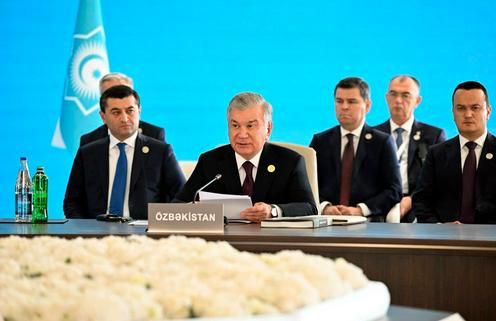President of Uzbekistan Shavkat Mirziyoyev has proposed the establishment of a Permanent Council of Turkic States for Economic Partnership. The initiative was announced at the 12th Summit of the Organization of Turkic States (OTS), held on October 7 in Gabala, Azerbaijan, under the theme “Regional Peace and Security.”
In his address, Mirziyoyev emphasized that in a short period, the OTS has become one of the fastest-growing international organizations, with mutual trade between member countries steadily increasing and expected to double by 2030. Cooperation within the organization now spans more than 35 areas, including trade, investment, transportation, and humanitarian programs.
“To ensure the consistent development of practical cooperation and the implementation of specific projects—particularly in coordinating plans within the Turkic Investment Fund—it is time to establish a Permanent Council of Turkic States for Economic Partnership. It is important that this structure be headed by deputy prime ministers of our countries and operate on a permanent basis,” Mirziyoyev said.
He proposed locating the Council’s Project Office in Tashkent.
According to Mirziyoyev, the Council will oversee several strategic initiatives, including:
▪️ the creation of a Space of New Economic Opportunities;
▪️ the formation of a Turkic States Industrial Alliance in sectors such as mechanical engineering, mining, electrical engineering, petrochemicals, pharmaceuticals, light and food industries;
▪️ and the production of building materials.
Particular attention will be given to the introduction of an electronic “Turkic Green Corridors” system to simplify customs procedures and boost trade volumes, as well as the establishment of a “Green Transformation” consortium to jointly implement projects in renewable energy, green hydrogen, and ammonia production—using advanced technologies and public-private partnership (PPP) mechanisms.
Mirziyoyev also proposed developing a Cooperation Program based on the principle “raw materials – processing – science and technology – finished product” to expand the strategic mineral resource base and the production of value-added goods.
On food security, the Uzbek leader noted that Turkic states have the potential to become global leaders in the production and export of organic agricultural products, with the global organic food market exceeding $225 billion and growing by 10% annually. He therefore proposed creating an expert working group under the supervision of agriculture ministers to bring organic products from Turkic countries to the world market under a unified brand.
Mirziyoyev also focused on transport integration, supporting the development of the Middle Corridor, stressing the importance of making it competitive through optimized transit tariffs, digitalized customs procedures, and improved infrastructure. He added that linking the Middle Corridor with the China–Kyrgyzstan–Uzbekistan railway and the prospective Trans-Afghan Corridor would create a multi-sectoral regional transport system.
A major event in this field will be the International Forum on Multimodal Transport, scheduled for November 12, 2025, in Tashkent, which will bring together transport ministers, logistics company executives, and experts.
To finance priority projects, Mirziyoyev called for expanding the operations of the Turkic Investment Fund and strengthening cooperation with the Islamic Development Bank, the European Bank for Reconstruction and Development, and other international financial institutions.
Turning to international affairs, Mirziyoyev stressed the need for joint meetings of the OTS foreign ministers and security service heads.
“The most painful global problems—protracted conflicts and wars across the Eurasian continent—undoubtedly have a negative impact on our states. We are all deeply concerned about the tragedy in Gaza, the situation around Ukraine, issues related to Iran’s nuclear program, and stability in Afghanistan.
We welcome the efforts and new initiatives of leading world powers to build a just world order and strengthen mutual trust and security. To thoroughly analyze global developments and make timely decisions, it is essential to hold joint meetings of the foreign ministers and heads of security services of the Organization of Turkic States,” Mirziyoyev said, proposing that the first such meeting be held in Samarkand in 2026.
In the technology and innovation sphere, Mirziyoyev proposed adopting a “Roadmap for Implementing Projects in Artificial Intelligence and the Creative Economy” and holding an International Exhibition of the Turkic World in Uzbekistan.
Discussing science and education, the president announced that Uzbekistan will chair the Union of Turkic Universities—which unites over 100 higher education institutions—during 2025–2026, and proposed organizing Days of Turkic Science and Innovation. He also announced the establishment of an International University of Turkic States in Uzbekistan, which will develop a joint research support program.
To counter youth radicalization, Mirziyoyev called for adopting an Action Plan on Combating Extremist and Radical Ideologies, along with broader initiatives for environmental education.
In the cultural sphere, he proposed organizing an international scholarly conference, “The Creative Legacies of Nizami Ganjavi and Alisher Navoi in the Spiritual Life of the Turkic World,” marking the anniversaries of the two great poets.
ℹ️ The Organization of Turkic States (OTS) was established in October 2009, previously known as the Cooperation Council of Turkic-Speaking States (Turkic Council). Its members are Azerbaijan, Kazakhstan, Kyrgyzstan, Turkey, and Uzbekistan, with Turkmenistan and Hungary participating as observers.
The Gabala Summit, chaired by Azerbaijani President Ilham Aliyev, was also attended by Kazakh President Kassym-Jomart Tokayev, Kyrgyz President Sadyr Japarov, Turkish President Recep Tayyip Erdoğan, National Leader of the Turkmen People Gurbanguly Berdimuhamedow, Hungarian Prime Minister Viktor Orbán, and OTS Secretary-General Kubanychbek Omuraliev, among others.
At the conclusion of the summit, the OTS member states signed the following documents:
✅ Gabala Declaration of the Organization of Turkic States;
✅ A decision to launch the “OTS+ (OTS Plus)” format for cooperation with non-member countries;
✅ A decision to strengthen the International Organization of Turkic Culture (TURKSOY).










